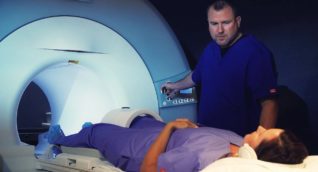Magnetic resonance imaging (MRI) of the prostate is a special scan that uses a strong magnetic field, radio waves, and a computer to generate images of a man’s prostate gland. This test is generally used to evaluate the prostate for signs of cancer or to see if prostate cancer has spread to nearby structures. MRI may also be used to evaluate other problems associated with the prostate such as infection, enlargement, or congenital abnormalities.
In most cases, your doctor will order a prostate MRI with intravenous (IV) contrast. This allows for better visualization of the gland and other related structures. Please refer to the About Contrast section for more details.
Prostate MRI is used to help evaluate signs and symptoms associated with prostate disease. Some examples of the uses of prostate MRI include:
- Evaluating prostate cancer size and whether it has spread
- Monitoring the progress of prostate treatment
- Detecting prostate infection (prostatitis) or a prostatic abscess
- Diagnosing prostate enlargement (called benign prostatic hyperplasia or BPH)
Prostate MRI may also be recommended when planning for prostate or pelvic surgery, radiation therapy, or biopsy.
Benefits
- Prostate MRI scan is noninvasive and painless.
- In a single scan, prostate MRI can evaluate soft tissue, and blood vessels.
- MRI scan does not expose you to any ionizing radiation.
- An MRI exam may help you avoid exploratory surgery.
- MRI provides highly detailed images of pelvic structures and can assist in the diagnosis and evaluation of prostate cancer and other prostate related illnesses.
Risks
- Any medical devices implanted into your body may be at risk of malfunction due to the strong magnetic field. See Can I have an MRI if I have metal in my body?
- In very rare cases, in patients with poor kidney function, nephrogenic systemic fibrosis is a possible complication when contrast is used. Please refer to the About MRI Contrast section for more details.
- Gadolinium-based contrast has a very slight risk of causing an allergic reaction which can usually be easily treated.
- Prostate MRI is typically done in an ARA imaging center and takes a total of about 20 to 40 minutes.
- You will be asked to change into a gown. You must remove all jewelry and metal from your body.
- You’ll be placed on a moveable exam table which may have straps or bolsters to help keep your body from moving.
- If your study requires contrast, your technologist will place an intravenous (IV) line into your arm or hand to administer the contrast. IV placement may be uncomfortable and may cause bruising later but for most this is not the case. A saline solution drip may be used to help keep the IV line open.
- The technologist will leave the MRI room where you are and conduct the exam from a computer in a control room. You will be able to speak with the technologist at all times. The technologist has direct visualization of you and the room. They will keep you informed of what is happening as your exam progresses.
- When the procedure begins, the table moves you into the magnet, which is a cylinder-shaped machine.
- MRI scanners are constructed with short tunnels that are open on both ends. Most people do not find this to be uncomfortable, but if you are anxious, please mention this to your scheduler. ARA may be able to schedule your exam on one of our open-bore or short-bore MRI scanners or plan for you to have light sedation. ARA technologists and our clinical staff are experts at helping people through MRI exams with minimum anxiety.
- During the exam you might feel warmth in the body part being examined. If this becomes uncomfortable, let your technologist know.
- When the images are being taken, you will hear loud knocking, tapping or thumping sounds. Earplugs or headphones with music are provided before the test begins.
- In rare cases, some patients experience side effects from the contrast material, such as nausea or headache. If you experience any discomfort, let the technologist know.
- You will be required to change into a gown. If possible, leave all jewelry and metal objects at home.
- Unless you are told otherwise, you may follow your normal diet and routine before the exam. You should take all your medications as usual.
- Some MRI exams require a prep which may include no food or drink for a specified time before the exam. Your scheduler will inform you of preparations if needed. If you are not given special instructions, you may follow your normal diet and routine before the exam.
- Ask your doctor for specific directions about your daily medications if you have been asked to refrain from taking them.
- Be sure to tell your technologist about any illness or allergies you may have. Also, provide a list of your current medications.
- If you suffer from claustrophobia, panic attacks or anxiety, you might choose to receive sedation before the exam. Please mention this to your scheduler when making your appointment.
- Before you schedule an MRI, refer to the section Can I have an MRI if I have metal in my body? to get more information about metal devices, implants or any other metal that might be affected by the magnet.
- In some cases, an X-ray may be taken before the MRI to detect any metal that could be located inside your body.
To schedule a prostate MRI, please use our online scheduling tool in the Patient Portal or you may call our scheduling team at (512) 453-6100 or toll free at (800) 998-8214. A referral from your healthcare provider is required to make an appointment.
A radiologist, a physician specifically trained to interpret radiological examinations, will analyze the images and send a signed report to the provider who referred you to ARA. The physician will then share the results with you.

